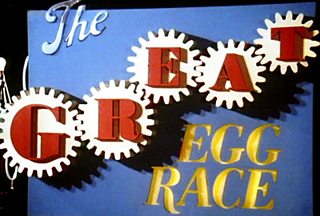
The Βι¶ΉΤΌΕΔ Archive is one of the largest multimedia archives in the world with over a million hours of TV and radio programmes, six million photographs, four million items of sheet music, and over half-a-million documents and records. With such a mass of information, picking what material to put online can be quite a challenge!
One of the things we've been focussing on this year is science - that's because throughout 2010 all parts of the Βι¶ΉΤΌΕΔ have been looking to celebrate science. Honestly, I'm not sure if most people think of archive and science as being a natural combination. After all science is all about the new - the latest discovery, the most current theory - and archive is, well, very much not new.
But, throughout this year we've been putting television and radio programmes online which hopefully show that archive and science actually work rather well together.
So, firstly we put up a of programmes from 27 years ago, which feature a man sitting in an armchair discussing things like why rubber bands are stretchy and why tennis balls can't bounce forever. Which may sound dull, until I tell you that the man in the chair is Richard Feynman. My physics education stopped after GCSEs but I still love these programmes because Feynman, a genius physicist known as the 'Great Explainer', has an amazing knack for getting you to share some of his joy in the way the world really works.
Next on our science journey came some more which heavily featured men in armchairs. (Can you see a theme developing?) But again there is a reason why these interviews got us excited. All of these people have won a Nobel Prize (). On top of that, although these interviews were recorded back in 1985 they had never been seen before. The interviewer, Lewis Wolpert - himself a renowned scientist - recorded them simply for posterity, realising that the world would be a poorer place without a record of these discoveries and the men who made them. It's because of this forethought that we can now watch these eminent scientists explain what it's really like to make incredible discoveries.
Our next archive-meets-science moment is perhaps not as ground-breaking but it is definitely inspirational. Today we've released some of the best programmes from much-loved '80s DIY-science show ''. I'm a bit too young to remember this the first time round but lots of people in the office could hum the theme tune, and remembered this programme with huge affection. Particularly because of presenter Heinz Wolff - an important scientist in his own right who revels in the show's low-tech ingenuity. The collection aims to inspire people to get into their sheds and start inventing ready for a new TV show in which will be looking for an invention worthy of preserving for immortality (well in a future Aardman production anyway).
So is that it for archive and the year of science? Well not quite. Coming up on 18th October we have a collection of recordings and documents from a man who, whilst not a scientist himself, had a huge passion for getting people to think about how science and technology might change the world. The man in question is HG Wells and this collection is being released to coincide with a fabulous upcoming Βι¶ΉΤΌΕΔ Four adaptation of Wells' 1901 classic '', starring (and adapted by) Mark Gatiss. I was lucky enough to get to see a preview of this drama and I really felt that the themes of the archive recordings - about balancing discovery with responsibility - resonated throughout this faithful and thoughtful adaptation.
One of the amazing things about these recordings is that Wells almost seems to be predicting some of the things which have since happened. Listen carefully and you could think that he's describing wikipedia, online book stores and maybe even budget airlines!
And perhaps that's one of the points of archive and science - it is only by looking back that we can realise how far forward we've come. How discoveries which seemed so miraculous and strange are now almost part of the everyday. That we actually live in the future. Having said that though, if there's anything that the Feynman programmes have taught me it's that some things never change, one of them - our enduring interest in finding things out.
Kate Wheeler is Editorial Lead, Βι¶ΉΤΌΕΔ archive project
Explore the
Become a friend of
Follow